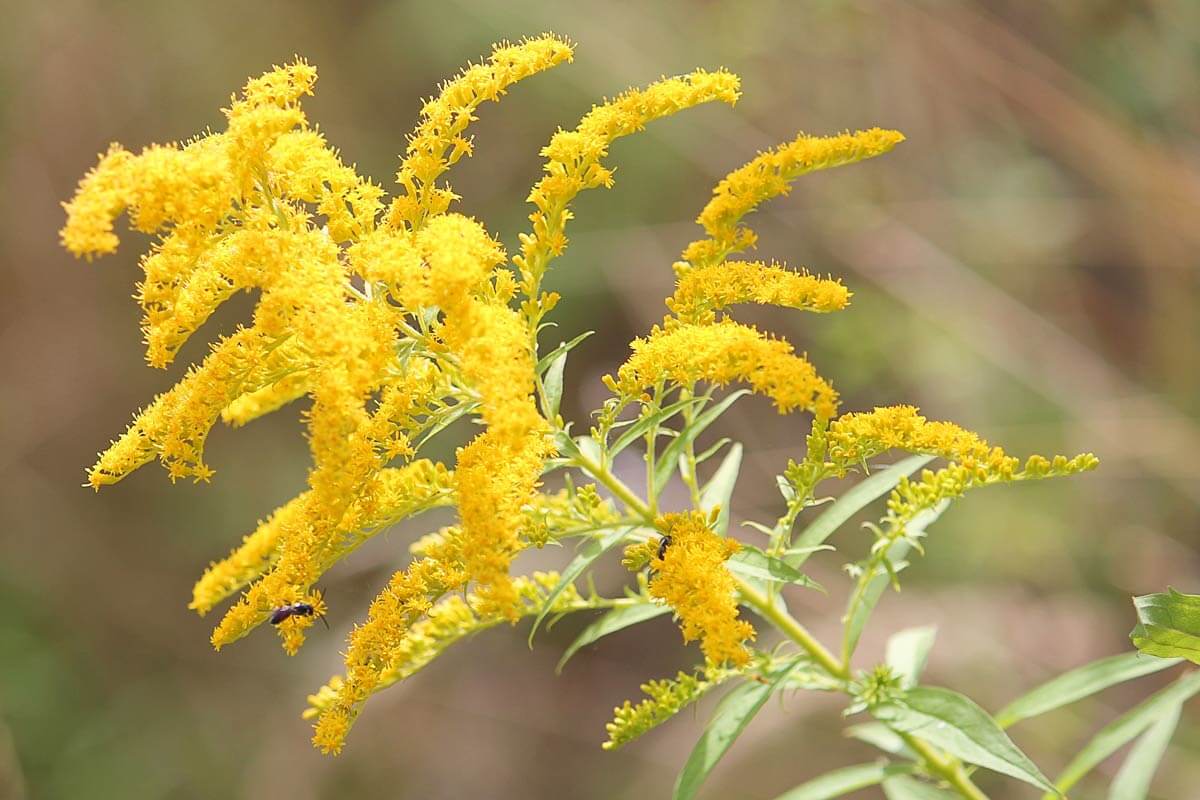Gardening is deeply beneficial to not only the aesthetics and feel of your space but your health as well.
The manual labor of gardening is good for your heart as it gets you active.
Getting in tune with the earth also reduces stress, makes you happy, and gives your vitamin D levels.
Plus, it is also a great opportunity to bond with the family since it is a good activity to share with your spouse, kids, parents, siblings, and more.
If you enjoy being outdoors and gardening, you are always looking for different flowers and plants for your garden or space.
Goldenrod is a pleasant plant with green foliage and sweet golden blossoms.
When looking to add a pop of color to your garden, this flower is bound to put a smile on your face.
The only challenge is that you own a curious dog at home.
Having a toxic plant can wreak havoc on his health.
It is thus your responsibility to find out if Goldenrods are safe for your pet or not.
We have got you covered on that front…
What is Goldenrod?
Also known as Solidago virgaurea or Solidago canadensis, Goldenrod is a flowering herbaceous perennial native to North America but one that is now found across the planet.
The plant is a member of the aster family and genus Solidago.
It is tall and slim with fluffy thorns that come in many shades of yellow.
They are particularly attractive when they bloom from July to September.
Gardeners love its medium green foliage that contrasts with the bright golden flower spikes.
It is also a great food source for pollinating insects, especially the Monarch butterfly.
It grows along roadsides and open fields.
According to Healthline, the Goldenrod has long been utilized for its wide range of health benefits.
It is believed to have anti-inflammatory characteristics and relieves pain and swelling.
With saponins as part of its chemical makeup, the plant may also have antifungal benefits.
Very Well Health claims that goldenrod species are used to treat bacterial infections, diabetes, fungal infections, pain, and rheumatism.
For dogs, the Goldenrod is used to treat kidney stones and cleanse the bladder and kidneys, thanks to its diuretic properties.
Is Goldenrod Poisonous To Dogs?

Goldenrod species are quite a number (some sources say there are more than a hundred of them).
There’s no source detailing the toxicity or lack thereof of all the species.
However, the ASPCA has listed one common Goldenrod variety called the Rayless Goldenrod or the Haplopapps heterophyllous as being harmless to dogs and cats.
The yellow beauty contains a toxic element called trematol that can poison a horse but not dogs or cats.
Even in small quantities, ingestion of any part of the plant by a horse can lead to fatal effects.
Tremetol poisoning in horses causes symptoms such as:
- Gastrointestinal upset
- Loss of appetite
- Weakness
- Breathing difficulties
- Sweating
- Hypothermia
- Hyperthermia
- Coma
- And death among others.
Some sites claim that tremetol affects all animals including humans, dogs, and cats among others.
They further maintain that small amounts of tremetol can cause muscle tremors as a symptom of severe intoxication. The effects can be immediate or long-term.
The ASPCA is always superior to other online sources when it comes to your pet’s health.
Ultimately, we side with them on the fact that Goldenrod is safe for dogs.
My Dog Ate Goldenrod: What Should I Do?
Even though Goldenrod is mostly harmless to canines, it is not necessarily the ideal food or play toy for your lovely pooch.
See, plant matter can affect dogs in different ways.
For instance, if taken in large quantities, it can lead to all kinds of gut problems such as discomfort, vomiting, and diarrhea.
Some dogs love eating grass, leaves, and other vegetation way too much.
Dogs suffering from pica enjoy munching non-edible items including flowering plants.
Others ingest leaves because of medical issues, boredom, and nutritional deficiencies.
Eating plant matter can cause blockage, especially in puppies when consumed in large quantities.
Goldenrod covered in pesticides and other harmful chemicals can make your dog very ill.
The bottom line is that you should monitor your doggie around the Goldenrod plants.
If something is amiss, let your pet know about it.
Parting Thoughts
Being a pet parent calls for caution on your part.
Your doggie doesn’t always know what is safe for him and what is not. You can only do that for him.
Thankfully, Goldenrods are safe for pups of all ages if taken in small quantities.
If your dog goes overboard with it, monitor him for any concerning symptoms and consequently contact your vet.
As an Amazon Associate, we may receive a small commission from qualifying purchases but at no extra cost to you. Learn more. Amazon and the Amazon logo are trademarks of Amazon.com, Inc, or its affiliates.

